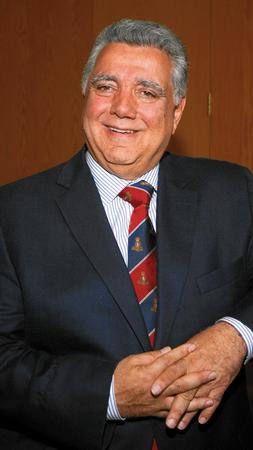Ethics charges dropped
Boca Raton Deputy City Manager George Brown and Councilman Robert Weinroth are off the Boca Raton Airport Authority board, and as of Wednesday the Florida Commission on Ethics is off their backs about their brief service on the board.
Last May, the council put Weinroth and Brown on the seven-member board as two of the city’s five appointees. The vote for Brown was unanimous. The vote for Weinroth was 3-2, with Weinroth in the majority.
After the appointments, BocaWatch Publisher Al Zucaro (above) filed complaints with the Florida Commission on Ethics against Weinroth and Brown. Weinroth, Zucaro alleged, had illegally nominated and voted for himself to secure “special private gain”—presumably the whopping $100 board members receive for attending each monthly meeting. (Weinroth said he had been unaware of the salary, and never accepted it.) Brown, Zucaro alleged, could not “serve two masters”—the city and the authority.
City Attorney Diana Grub Frieser had stated that neither appointment posed a conflict. The finding by the ethics commission validates that position. The commission found no probable cause that Weinroth “violated the voting conflict law” or that Brown “had a conflicting employment or contractual relationship due to his public duties on the (airport authority) board coupled with his employment with the city.” The decision came last month, but the commission formally announced the decision Wednesday.
As Mark Herron, the lawyer for Weinroth and Brown, pointed out in his response to the complaint, the appointments did not arise out of secret dealings. During its May goal-setting session last year, the city council collectively expressed frustration at the authority. Council members complained about what they considered to be communication problems, bad spending decisions and the slow pace of work on a customs facility.
Herron added that City Manager Leif Ahnell suggested that if council members wanted more accountability, they could choose a staff member and one of their own for two upcoming appointments. Days later, the council did so. The action was unusual, and it generated worries that the council was moving to take over the airport, which the city once ran. Authority board members expressed puzzlement at the complaints.
Soon enough, however, it became clear that Weinroth and Brown were focused on the goals the council had discussed. Citing progress, Weinroth and Brown resigned from the authority in December and February, respectively. The council replaced them with two traditional board members. All that remained were the ethics complaints.
Zucaro, of course, is a regular—and often off-base— council critic. He denied that the complaints were frivolous or politically motivated, but he undercut his case by arguing that the city should not hire an outside lawyer at taxpayer expense to defend Weinroth and Brown. They were acting as “individuals,” Zucaro said, and should pay their own legal bills.
In fact, cities regularly and correctly defend officials accused of such complaints. Doing otherwise would discourage people from running for office. An ethics complaint could become a political weapon, not a needed check on abuses. When the council voted to provide the lawyer, Jeremy Rodgers noted that without the knowledge of city support in such issues Boca Raton would “run out” of people willing even to serve on boards.
Knowing that an unfavorable result was coming, Zucaro this week wrote a sore-loser post for his website. Zucaro complained that he traveled to Tallahassee for the commission’s Friday discussion but was not allowed to speak. Absent such “bias,” Zucaro wrote, he could have provided “additional clarity.”
Actually, the system for investigating ethics complaints against public officials is the same as the system for investigating complaints against judges. Once the complaint is filed, the Judicial Qualifications Commission staff takes over. It’s the best way to ensure an unbiased investigation.
Weinroth said Wednesday that he is relieved “to have the commission ratify the actions taken by the council. The actions which were the subject of Mr. Zucaro’s complaint were political. . .He is certainly entitled to disagree. . .but that doesn’t make those actions unethical or illegal.”
Delray votes yes on sales tax
The Delray Beach City Commission’s vote Tuesday night in support of Palm Beach County’s sales tax proposal didn’t matter, but the discussion was interesting.
Next month, the county commission will decide whether to put a one-cent, 10-year increase on the November ballot and, if so, how to distribute the money. In its current form, the proposal allocates 18.5 percent—roughly $500 million—to the county’s 38 municipalities. Cities that include at least 51 percent of those living in the county’s 38 municipalities had to support the proposal for the county commission to take that final vote.
The proposal has become controversial because the current version includes $161 million for cultural organizations and other “economic development.” The county’s cultural council has maintained that adding money for museums and such will enhance support for bridge repair and road paving. But the council has been selective and secretive about which groups would get the money.
Tuesday night, Commissioner Mitch Katz said he’s heard complaints about Delray Beach’s Spady Museum not being on the list. He joined the unanimous vote in support of the proposal; Delray Beach stands to get about $3 million a year. Katz and his colleagues, though, are unhappy that the cities’ share will be based on population, not amount of sales generated. Under a “point of sale” formula, Delray would get more. State law prohibits it.
Boca Raton Mayor Susan Haynie said the city will not take a vote. The county has its 51 percent. Haynie said the city asked the county to address the council on the plan, but was told that “they don’t have anyone who can do it.”
As for Haynie’s personal view of the tax plan, “I have trouble supporting it because we are a border city, and it will negatively affect our businesses.” The sales tax in Broward is also 6 percent, though Broward may put its own one-cent increase on the ballot to finance transportation improvements.
Uptown Atlantic
Applause broke out Tuesday night when the Delray Beach City Commission gave final approval to Uptown Atlantic. Next come “shovels in the ground,” Mayor Cary Glickstein said.
In my preview of the vote, I wrote of the importance that the Fairfield Inn has had on West Atlantic Avenue redevelopment. Former Mayor Jeff Perlman countered on social media that Atlantic Grove was actually the first significant development. Like Uptown Atlantic, Atlantic Grove is a mixed-used project. It predated the Fairfield project, but I would maintain it is less important in terms of what it means to future West Atlantic development.
Atlantic Grove borders the tennis center. Fairfield Inn is closer to Interstate 95 than to Swinton Avenue. As Mayor Glickstein said, the hotel broke through the perception that businesses can’t succeed if they are farther west on Atlantic. I would go with the current mayor’s assessment over the former mayor’s.
Atlantic Crossing
On Tuesday, I wrote about Delray Beach’s latest move in the Atlantic Crossing lawsuit. I said the lawsuit seeks $25 million in damages for what the developers claim is the city’s failure to give the project timely approval.
An Atlantic Crossing representative emailed to say that the most recently amended lawsuit, which the developers filed in January, asks for damages “in excess of $25 million.” The representative added that a consultant whom the developer hired “estimated the damages to be over $40 million.”
Tension between Delray Beach and the developers increased two weeks ago, when the city commission voted 3-2 to deny Atlantic Crossing’s appeal of its site plan rejection. That plan included an access road to the project from Federal Highway. A city consultant liked the road. The commission majority on April 5—Mayor Glickstein and commissioners Mitch Katz and Shelly Petrolia—didn’t. Tuesday night, the commission unanimously moved to take back public alleys that had been conveyed to Atlantic Crossing.
Edwards Companies Vice President Don DeVere said in a statement that the commission “could have continued settlement discussions to provide additional benefits to the neighborhood, and to eliminate the city’s risk of damages, estimated at $40 million. Mayor Glickstein and Commissioners Petrolia and Katz decided they didn’t want to take that path, but chose to litigate instead.
“Since the city declined to approve the site plan modification, there’s no way we can continue with that plan. That leaves only one option — to move forward with the litigation and to develop the project in accordance with the already approved plan, which doesn’t include the added access drive.”
In addition to increasing the amount of alleged damages, the latest version of the lawsuit increased the rhetoric. The lawsuit refers to “commission regime change” in March 2013, when Glickstein and Petrolia were elected after criticizing the approval of Atlantic Crossing three months earlier. The lawsuit further claims that Glickstein is acting out of spite because he tried and failed to develop the same property west of Veterans Park.
Condolences
Condolences go out this week to Boca Raton City Councilman Scott Singer and his family. Singer’s mother died Monday at age 70. The funeral was Wednesday.
Correction
In writing recently about Chabad East Boca, I said the Golden Triangle neighborhood had opposed the project. Golden Triangle Homeowners Association President Andrea O’Rourke told me this week that while some residents might have opposed it, the group took no position on Chabad East Boca.
And more…
Speaking of Ms. O’Rourke, there has been speculation that she would run for the Boca Raton City Council next March—either against Scott Singer or for the seat of term-limited Mike Mullaugh. O’Rourke told me that she will not run for the council. I asked if she was willing to say that on the record. Her response: “On the record.”
About the Author
Randy Schultz was born in Hartford, Conn., and graduated from the University of Tennessee in 1974. He has lived in South Florida since then, and in Boca Raton since 1985. Schultz spent nearly 40 years in daily journalism at the Miami Herald and Palm Beach Post, most recently as editorial page editor at the Post. His wife, Shelley, is director of The Learning Network at Pine Crest School. His son, an attorney, and daughter-in-law and three grandchildren also live in Boca Raton. His daughter is a veterinarian who lives in Baltimore.








